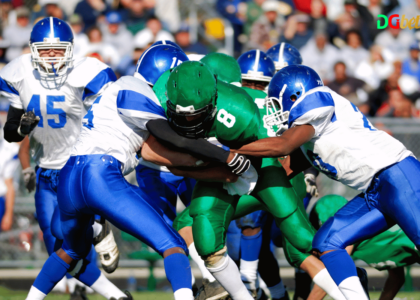Are you ready to turn your NHL playoff betting game from rookie mistakes to Stanley Cup level victories? Let’s dive in!
Betting on the NHL playoffs and the Stanley Cup is an exhilarating yet intricate endeavor. The allure of potentially high rewards pairs with the challenge of navigating a highly unpredictable sports environment. Understanding the key elements of playoff betting, from critical strategies to advanced metrics, is essential for making informed decisions.
Throughout this blog, we’ll explore the crucial aspects of NHL playoff betting, covering everything from goaltending impacts to the significance of player injuries and advanced statistical insights. Dive in to gain a comprehensive understanding of how to approach your NHL playoff bets wisely and effectively.
Key NHL Playoff Betting Strategies
Betting on the NHL Playoffs requires solid strategies and an understanding of betting theories. Here are some key approaches to enhance your chances of success.
- Momentum and the fear of elimination
Momentum is a huge factor in NHL playoff betting. Teams on winning streaks tend to have an edge, but a team facing elimination often plays with extra urgency and intensity. For instance, if a team is down 2-3 in the series, their desperation to stay alive can make them a strong bet, as they are highly motivated to avoid elimination.
- Analyzing matchups
To make smarter bets, it’s crucial to analyze matchups carefully. Look at factors like roster strength, injuries, playoff experience, and current form. Teams with veteran players may handle pressure better than inexperienced ones. Also, head-to-head results can reveal how teams match up, but remember, playoff hockey is more intense and strategic than regular season games.
- Special teams and advanced stats
Power plays and penalty kills often decide playoff games. A team with a strong power play can turn mistakes into goals, making this an important factor to consider. Additionally, advanced stats like puck possession (Corsi or Fenwick) can highlight teams likely to improve over the series. Betting based on these stats can be more reliable than following media hype or popular narratives.
Avoid betting based on common myths, like the belief that only teams with elite goaltenders can win the Stanley Cup. Instead, trust concrete data and trends for more informed decisions.
Here is a youtube video which offers a comprehensive preview, predictions, and betting tips for the Stanley Cup finals, which can prove to be highly relevant to you in case you are looking to enhance your betting strategies during the series. https://www.youtube.com/watch?v=rS5PSEIbp1g
Now that you have a handle on key strategies, let’s delve into why game analysis and coaching are non-negotiables in NHL playoff betting.
Why Game Analysis And Coaching Matter In NHL Playoff Betting?
If you want to bet smartly on the NHL Playoffs and Stanley Cup, it’s not just about stats. You need to dig deeper into how games are played and how coaches influence the action. Understanding the flow of the game and the strategic decisions made by coaches can give you a real edge. Here are a few things that you need to keep in mind.
- Watch games closely for key insights
To get ahead, you need to be more than a casual watcher. Pay attention to how teams move from defense to offense, how players position themselves, and the adjustments coaches make during the game.
For example, in Game 6 of the Stanley Cup Finals, Edmonton Oilers’ coach Kris Knoblauch challenged a goal by Florida’s Aleksander Barkov. The goal was overturned due to an offside call, and the game’s momentum completely shifted. Watching for these types of moments can give you betting insights that go beyond what the stats show.
- The role of coaches in changing the game
Coaches are key decision-makers, and their strategies can make or break a series. They constantly adjust their lineups and tactics to outplay the competition.
For instance, Knoblauch made bold decisions by benching experienced players like goalie Stuart Skinner and veteran Corey Perry to benefit the team. Meanwhile, Florida Panthers’ coach Paul Maurice, with over 1,900 games and 939 wins, showed his expertise by tweaking his lines to come back from a 2-1 series deficit against the Rangers. Keeping an eye on how coaches adapt can offer valuable clues for your betting strategy.
- Special teams and in-game adjustments
Special teams—power plays and penalty kills—often decide the outcome of playoff games. Understanding how teams perform in these situations can give you a betting edge. The Oilers, for example, are deadly on the power play, with a 37.3% success rate, thanks to stars like Connor McDavid and Leon Draisaitl. Their penalty kill is also one of the best in the playoffs. On the flip side, the Panthers were able to shut down the Rangers’ power play in the conference final. Watching how teams adjust in real time, especially with special teams, can greatly influence your betting decisions.
Platforms like DGbet often provide detailed game analysis and insights that can help you make more informed bets.
Alright, with strategies and coaching insights covered, it’s time to spotlight one of the biggest X-factors in playoff hockey: goaltending.
The Impact Of Goaltending In NHL Playoffs
Goaltending is one of the most decisive factors in the NHL playoffs and Stanley Cup series. A top-notch goalie can carry a team to victory, while a weak performance between the pipes can lead to disaster. Understanding the role of goaltenders is key to making smarter betting choices.
How goaltenders shape playoff success
A great goaltender can be the backbone of a team’s playoff success. They are the last line of defense, and their ability to make big saves can shift the momentum of an entire series. Take Jeremy Swayman of the Boston Bruins, for example, who leads the league with a .919 save percentage on mid-range shots. His consistent saves have a direct impact on the team’s confidence and betting outcomes. Similarly, Igor Shesterkin of the New York Rangers, who led the league in goals saved above expected after the All-Star break, shows how elite goaltending frees up the rest of the team to play more aggressively, knowing their goalie has their back.
Game-changing goaltending in Stanley Cup history
History shows countless examples of goaltenders being the key to their team’s playoff success. Recently, the Vegas Golden Knights used a goalie rotation with Laurent Brossoit and Adin Hill to win the Stanley Cup. Their combined efforts were crucial in securing the title. Another standout performance was from Jake Oettinger of the Dallas Stars. His 24-save game against the Colorado Avalanche helped push his team’s playoff run and solidified his impressive postseason stats.
Using goaltending performance for betting insights
For bettors, keeping an eye on goalie stats can provide valuable insights. Metrics like save percentage on high-danger shots and goals saved above expected can give you an idea of a goalie’s current form. For example, Frederik Andersen’s .870 save percentage on high-danger shots indicates strong reliability, making him a solid bet in future matchups.
On the flip side, it’s important to identify goalies with weaker performances in key situations. Sergei Bobrovsky’s .809 save percentage on high-danger shots, for instance, may raise concerns when betting on his games, especially against a high-powered offense like the Tampa Bay Lightning, who lead the league with a 23% shooting percentage on such shots.
Speaking of game-changing elements, let’s not overlook the monumental impact injuries can have on NHL playoff outcomes.
Evaluating Player Injuries In NHL Playoffs
Injuries can be the deciding factor between winning the Stanley Cup or an early playoff exit. Historically, teams that stay healthier tend to perform better in the playoffs, making it crucial for bettors to pay attention to player injuries when placing bets.
Why does evaluating injuries matter in the playoffs?
Injuries don’t just sideline players—they can affect the entire team’s performance. Losing a star player can lower team morale and disrupt game strategy. Even when injured players return, they often aren’t at full strength.
For example, Aaron Ekblad played through the 2023 playoffs with multiple injuries, including a broken foot and torn oblique, which severely affected his game. Similarly, Radko Gudas played with a high ankle sprain, making him less effective. When betting, it’s important to know how injuries can reduce a player’s performance on the ice.
Key injury examples impacting teams
In NHL history, several key injuries have shifted the course of a playoff series:
- 2023 Playoffs: Aaron Ekblad’s multiple injuries weakened his team’s defense.
- 2023 Playoffs: Matthew Tkachuk played with a broken sternum, affecting his aggressive playstyle.
- 2017 Playoffs: Erik Karlsson played with two foot fractures, and Joe Thornton with torn knee ligaments, both of which limited their usual standout performances.
- 2013 Finals: Patrice Bergeron famously played through a broken rib, punctured lung, and separated shoulder, but these injuries impacted his effectiveness.
These examples show how injuries can change the momentum of a series and make a team less threatening.
Using injury reports for smarter bets
Keeping an eye on injury reports is key to making informed betting decisions. Here’s how you can use this information:
- Team impact: A team with several injured players may struggle to keep up their performance, especially during long playoff series.
- Player performance: Even if star players like Connor McDavid or Leon Draisaitl are playing, injuries can limit their effectiveness, so adjust your expectations.
- Predicting outcomes: Look for patterns in injury reports to see which teams tend to suffer from more injuries and adjust your betting strategy accordingly.
Monitoring injury trends can give you a betting edge by helping you understand which players may struggle and which teams could falter due to health issues. This kind of insight leads to more calculated and informed bets.
Advanced Metrics For Smarter NHL Playoff Betting
Traditional stats might not tell you the whole story when betting on the NHL playoffs. Advanced metrics like Corsi, Quality of Chances, PDO, and Shot Totals give deeper insights into team performance and can help you make more informed bets.
- Corsi: More Than Just Shots
Corsi measures all shot attempts, including shots on goal, missed shots, and blocked shots. It’s a great way to understand a team’s puck possession and offensive pressure. A team with a high Corsi For (CF) is creating lots of shot opportunities, while Corsi Against (CA) shows how many shots they are allowing. The difference between CF and CA, known as the Corsi Differential, gives you a clearer picture of whether a team is dominating or struggling defensively.
- Quality of Chances: It’s Not Just About the Number of Shots
Not all shots are equal. The Quality of Chances metric looks at how good the scoring opportunities are, not just how many there are. High-Danger Scoring Chances track shots taken from prime areas like the slot or off rebounds. A team that generates more quality chances is more likely to turn those into goals, which makes them a stronger bet.
- PDO: Separating Skill from Luck
PDO combines a team’s shooting percentage and save percentage to show how much luck plays a part in their performance. A team with a very high PDO might be benefiting from good luck and could regress to normal performance levels over time. On the other hand, a team with a low PDO might have room for improvement. This “regression to the mean” is important to consider, as teams often return to their expected level after a streak of unusually good or bad luck.
- Shot Totals: Predicting Outcomes
Shot totals help predict future performance. Metrics like “Shot Attempts per 60 Minutes” account for different game lengths and give you a more accurate way to compare teams. More shots usually mean more scoring opportunities, while fewer shots allowed point to strong defense.
- Law of Averages: The Long Game in a Series
As a playoff series progresses, advanced stats become more useful. The law of averages suggests that teams with strong stats like possession and Quality of Chances will eventually turn things around, even if they’re trailing early on.
By using these advanced metrics, you can make more informed bets and improve your chances of success as the playoffs unfold.
Betting with a platform like DGbet, which offers comprehensive data analytics, can significantly improve your understanding and betting decisions using these advanced metrics.
Conclusion
NHL playoff betting is all about going beyond the basics. By tapping into advanced metrics like Corsi, Quality of Chances, and PDO, you can uncover deeper insights into team performance and make smarter bets.
Don’t forget to factor in player injuries and coaching strategies, which can sway the outcome of games. As the playoffs unfold, remember that teams often revert to their true form. With these tools and insights at your disposal, you’ll be better equipped to navigate the excitement and boost your betting success.
Are you ready to turn your NHL playoff betting game from rookie mistakes to Stanley Cup level victories? Let’s dive in!
Betting on the NHL playoffs and the Stanley Cup is an exhilarating yet intricate endeavor. The allure of potentially high rewards pairs with the challenge of navigating a highly unpredictable sports environment. Understanding the key elements of playoff betting, from critical strategies to advanced metrics, is essential for making informed decisions.
Throughout this blog, we’ll explore the crucial aspects of NHL playoff betting, covering everything from goaltending impacts to the significance of player injuries and advanced statistical insights. Dive in to gain a comprehensive understanding of how to approach your NHL playoff bets wisely and effectively.
Key NHL Playoff Betting Strategies
Betting on the NHL Playoffs requires solid strategies and an understanding of betting theories. Here are some key approaches to enhance your chances of success.
- Momentum and the fear of elimination
Momentum is a huge factor in NHL playoff betting. Teams on winning streaks tend to have an edge, but a team facing elimination often plays with extra urgency and intensity. For instance, if a team is down 2-3 in the series, their desperation to stay alive can make them a strong bet, as they are highly motivated to avoid elimination.
- Analyzing matchups
To make smarter bets, it’s crucial to analyze matchups carefully. Look at factors like roster strength, injuries, playoff experience, and current form. Teams with veteran players may handle pressure better than inexperienced ones. Also, head-to-head results can reveal how teams match up, but remember, playoff hockey is more intense and strategic than regular season games.
- Special teams and advanced stats
Power plays and penalty kills often decide playoff games. A team with a strong power play can turn mistakes into goals, making this an important factor to consider. Additionally, advanced stats like puck possession (Corsi or Fenwick) can highlight teams likely to improve over the series. Betting based on these stats can be more reliable than following media hype or popular narratives.
Avoid betting based on common myths, like the belief that only teams with elite goaltenders can win the Stanley Cup. Instead, trust concrete data and trends for more informed decisions.
Here is a youtube video which offers a comprehensive preview, predictions, and betting tips for the Stanley Cup finals, which can prove to be highly relevant to you in case you are looking to enhance your betting strategies during the series. https://www.youtube.com/watch?v=rS5PSEIbp1g
Now that you have a handle on key strategies, let’s delve into why game analysis and coaching are non-negotiables in NHL playoff betting.
Why Game Analysis And Coaching Matter In NHL Playoff Betting?
If you want to bet smartly on the NHL Playoffs and Stanley Cup, it’s not just about stats. You need to dig deeper into how games are played and how coaches influence the action. Understanding the flow of the game and the strategic decisions made by coaches can give you a real edge. Here are a few things that you need to keep in mind.
- Watch games closely for key insights
To get ahead, you need to be more than a casual watcher. Pay attention to how teams move from defense to offense, how players position themselves, and the adjustments coaches make during the game.
For example, in Game 6 of the Stanley Cup Finals, Edmonton Oilers’ coach Kris Knoblauch challenged a goal by Florida’s Aleksander Barkov. The goal was overturned due to an offside call, and the game’s momentum completely shifted. Watching for these types of moments can give you betting insights that go beyond what the stats show.
- The role of coaches in changing the game
Coaches are key decision-makers, and their strategies can make or break a series. They constantly adjust their lineups and tactics to outplay the competition.
For instance, Knoblauch made bold decisions by benching experienced players like goalie Stuart Skinner and veteran Corey Perry to benefit the team. Meanwhile, Florida Panthers’ coach Paul Maurice, with over 1,900 games and 939 wins, showed his expertise by tweaking his lines to come back from a 2-1 series deficit against the Rangers. Keeping an eye on how coaches adapt can offer valuable clues for your betting strategy.
- Special teams and in-game adjustments
Special teams—power plays and penalty kills—often decide the outcome of playoff games. Understanding how teams perform in these situations can give you a betting edge. The Oilers, for example, are deadly on the power play, with a 37.3% success rate, thanks to stars like Connor McDavid and Leon Draisaitl. Their penalty kill is also one of the best in the playoffs. On the flip side, the Panthers were able to shut down the Rangers’ power play in the conference final. Watching how teams adjust in real time, especially with special teams, can greatly influence your betting decisions.
Platforms like DGbet often provide detailed game analysis and insights that can help you make more informed bets.
Alright, with strategies and coaching insights covered, it’s time to spotlight one of the biggest X-factors in playoff hockey: goaltending.
The Impact Of Goaltending In NHL Playoffs
Goaltending is one of the most decisive factors in the NHL playoffs and Stanley Cup series. A top-notch goalie can carry a team to victory, while a weak performance between the pipes can lead to disaster. Understanding the role of goaltenders is key to making smarter betting choices.
How goaltenders shape playoff success
A great goaltender can be the backbone of a team’s playoff success. They are the last line of defense, and their ability to make big saves can shift the momentum of an entire series. Take Jeremy Swayman of the Boston Bruins, for example, who leads the league with a .919 save percentage on mid-range shots. His consistent saves have a direct impact on the team’s confidence and betting outcomes. Similarly, Igor Shesterkin of the New York Rangers, who led the league in goals saved above expected after the All-Star break, shows how elite goaltending frees up the rest of the team to play more aggressively, knowing their goalie has their back.
Game-changing goaltending in Stanley Cup history
History shows countless examples of goaltenders being the key to their team’s playoff success. Recently, the Vegas Golden Knights used a goalie rotation with Laurent Brossoit and Adin Hill to win the Stanley Cup. Their combined efforts were crucial in securing the title. Another standout performance was from Jake Oettinger of the Dallas Stars. His 24-save game against the Colorado Avalanche helped push his team’s playoff run and solidified his impressive postseason stats.
Using goaltending performance for betting insights
For bettors, keeping an eye on goalie stats can provide valuable insights. Metrics like save percentage on high-danger shots and goals saved above expected can give you an idea of a goalie’s current form. For example, Frederik Andersen’s .870 save percentage on high-danger shots indicates strong reliability, making him a solid bet in future matchups.
On the flip side, it’s important to identify goalies with weaker performances in key situations. Sergei Bobrovsky’s .809 save percentage on high-danger shots, for instance, may raise concerns when betting on his games, especially against a high-powered offense like the Tampa Bay Lightning, who lead the league with a 23% shooting percentage on such shots.
Speaking of game-changing elements, let’s not overlook the monumental impact injuries can have on NHL playoff outcomes.
Evaluating Player Injuries In NHL Playoffs
Injuries can be the deciding factor between winning the Stanley Cup or an early playoff exit. Historically, teams that stay healthier tend to perform better in the playoffs, making it crucial for bettors to pay attention to player injuries when placing bets.
Why does evaluating injuries matter in the playoffs?
Injuries don’t just sideline players—they can affect the entire team’s performance. Losing a star player can lower team morale and disrupt game strategy. Even when injured players return, they often aren’t at full strength.
For example, Aaron Ekblad played through the 2023 playoffs with multiple injuries, including a broken foot and torn oblique, which severely affected his game. Similarly, Radko Gudas played with a high ankle sprain, making him less effective. When betting, it’s important to know how injuries can reduce a player’s performance on the ice.
Key injury examples impacting teams
In NHL history, several key injuries have shifted the course of a playoff series:
- 2023 Playoffs: Aaron Ekblad’s multiple injuries weakened his team’s defense.
- 2023 Playoffs: Matthew Tkachuk played with a broken sternum, affecting his aggressive playstyle.
- 2017 Playoffs: Erik Karlsson played with two foot fractures, and Joe Thornton with torn knee ligaments, both of which limited their usual standout performances.
- 2013 Finals: Patrice Bergeron famously played through a broken rib, punctured lung, and separated shoulder, but these injuries impacted his effectiveness.
These examples show how injuries can change the momentum of a series and make a team less threatening.
Using injury reports for smarter bets
Keeping an eye on injury reports is key to making informed betting decisions. Here’s how you can use this information:
- Team impact: A team with several injured players may struggle to keep up their performance, especially during long playoff series.
- Player performance: Even if star players like Connor McDavid or Leon Draisaitl are playing, injuries can limit their effectiveness, so adjust your expectations.
- Predicting outcomes: Look for patterns in injury reports to see which teams tend to suffer from more injuries and adjust your betting strategy accordingly.
Monitoring injury trends can give you a betting edge by helping you understand which players may struggle and which teams could falter due to health issues. This kind of insight leads to more calculated and informed bets.
Advanced Metrics For Smarter NHL Playoff Betting
Traditional stats might not tell you the whole story when betting on the NHL playoffs. Advanced metrics like Corsi, Quality of Chances, PDO, and Shot Totals give deeper insights into team performance and can help you make more informed bets.
- Corsi: More Than Just Shots
Corsi measures all shot attempts, including shots on goal, missed shots, and blocked shots. It’s a great way to understand a team’s puck possession and offensive pressure. A team with a high Corsi For (CF) is creating lots of shot opportunities, while Corsi Against (CA) shows how many shots they are allowing. The difference between CF and CA, known as the Corsi Differential, gives you a clearer picture of whether a team is dominating or struggling defensively.
- Quality of Chances: It’s Not Just About the Number of Shots
Not all shots are equal. The Quality of Chances metric looks at how good the scoring opportunities are, not just how many there are. High-Danger Scoring Chances track shots taken from prime areas like the slot or off rebounds. A team that generates more quality chances is more likely to turn those into goals, which makes them a stronger bet.
- PDO: Separating Skill from Luck
PDO combines a team’s shooting percentage and save percentage to show how much luck plays a part in their performance. A team with a very high PDO might be benefiting from good luck and could regress to normal performance levels over time. On the other hand, a team with a low PDO might have room for improvement. This “regression to the mean” is important to consider, as teams often return to their expected level after a streak of unusually good or bad luck.
- Shot Totals: Predicting Outcomes
Shot totals help predict future performance. Metrics like “Shot Attempts per 60 Minutes” account for different game lengths and give you a more accurate way to compare teams. More shots usually mean more scoring opportunities, while fewer shots allowed point to strong defense.
- Law of Averages: The Long Game in a Series
As a playoff series progresses, advanced stats become more useful. The law of averages suggests that teams with strong stats like possession and Quality of Chances will eventually turn things around, even if they’re trailing early on.
By using these advanced metrics, you can make more informed bets and improve your chances of success as the playoffs unfold.
Betting with a platform like DGbet, which offers comprehensive data analytics, can significantly improve your understanding and betting decisions using these advanced metrics.
Conclusion
NHL playoff betting is all about going beyond the basics. By tapping into advanced metrics like Corsi, Quality of Chances, and PDO, you can uncover deeper insights into team performance and make smarter bets.
Don’t forget to factor in player injuries and coaching strategies, which can sway the outcome of games. As the playoffs unfold, remember that teams often revert to their true form. With these tools and insights at your disposal, you’ll be better equipped to navigate the excitement and boost your betting success.






